Roof Damage Dilemma: Should You Call Your Contractor or Insurance First?
November , 2024 | 8 min. read

Imagine this: It's a typical stormy evening, and after a long day, you're ready to unwind at home. Amidst the usual household chaos, a sudden thunderstorm intensifies. Before you know it, a lightning strike sends a neighbor's oak tree limb crashing onto your roof. While the damage appears minimal, you're now faced with a pressing question.
"Should you contact your roofing contractor or call your insurance company first?
In this situation, it’s easy to let panic set in. However, upon inspecting the damage, you realize you just got lucky, and it’s not too bad. So, who do you call now? Your roofing contractor? Or your insurance company? At RoofCrafters, we’ve been helping homeowners in this exact predicament for 3 decades. Whether you’ve got an oak tree limb on your roof or are inquiring about a simple repair, we’ve got your back.
It can be hard to choose whom to call first when you’re inquiring about a roof repair, so to alleviate any confusion you may have as a homeowner, we’ve written this piece of content for you. In this article, you’ll learn if you should call your contractor or insurance company first regarding your roof repair, how contacting your roofer can help with the claims process, and what exactly insurance adjusters will look out for during their roof assessment. So, let's storm right in!
Who Should You Call First After Roof Damage? Contractor or Insurance?
Faced with roof damage, homeowners are often in dilemma about whom to contact first. The roofing contractor or the insurance company. In our 30 years of experience working with homeowners. We recommend reaching out to your roofing contractor first.

The reason for this is straightforward yet crucial. A roofing contractor can offer a thorough and professional evaluation of the damage. When your roofer inspects the damage, they bring their trained eye to the situation. They can help identify the obvious damages but also any underlying issues. Issues that an insurance adjuster might overlook. This detailed assessment from your contractor will be valuable for you. That is when the insurance adjuster shows up.
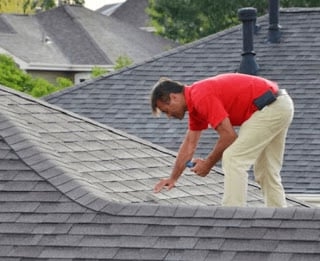
Your contractor can also talk to the insurance adjuster to help clarify the damage. This communication can help prevent any misunderstandings. Eliminating discrepancies during the insurance adjuster's evaluation. This will help strengthen your position when filing your insurance claim. Your roofer checks your insurance claim to make sure it covers the necessary repairs.
Filing an Insurance Claim for Roof Damage: Step-by-Step Process
If you’ve recently suffered damage of any kind to your roof, you’re going to want to file a claim with your insurance company. When you file a claim, keep in mind, it starts the entire process. Filing a claim that doesn't meet your deductible will still count against your policy as a claim filed. But, you don't receive any insurance benefits. The insurance company assigns an insurance adjuster and a lot of work happens behind the scenes.
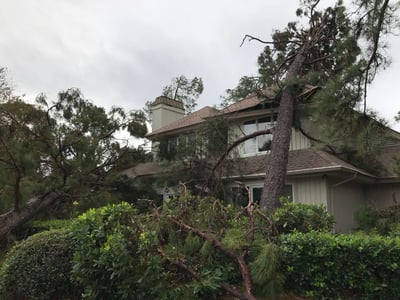
When it’s time to file the claim, you’ll need to have someone come out to make sure it is safe to be in and around the house. Second, you’ll need to secure the house. As the policyholder, you must mitigate any further damage to your property. In most cases, this means protecting the home's inside from water intrusion.
Here’s what happens once the call is made to report that you have storm damage and would like to open a claim:
-
Your insurance carrier will assign you a field adjuster.
-
The field adjuster will contact you within 72 hours to confirm a date for an onsite inspection.
-
The field adjuster will arrive on the confirmed date and perform an onsite inspection
-
The field adjuster will take measurements, and photos and document all damage.
-
The field adjuster will then return to their office and write the claim using an estimating program called Xactimate.
-
The field adjuster will turn the written estimate over to their superior(desk adjuster) for final review.
-
The desk adjuster will approve or deny the claim based on the photos and recommendations.
-
Once the claim is approved the desk adjuster will return the Xactimate estimate to the field adjuster.
-
The field adjuster will then send you the approved Xactimate estimate.
Understanding these steps can help you navigate the claim process more effectively.
Why Calling a Roofer First Can Help Your Insurance Claim
Contacting your roofing contractor before your insurance company can help with the claims process. Your roofer of choice will provide a fair inspection and advocate for you to the insurance adjuster if need be.
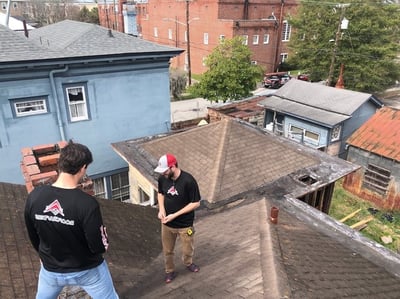
You can even have your roofer stick around when you meet with the insurance adjuster. As previously stated, this can open up a direct line of communication between the contractor and the adjuster.
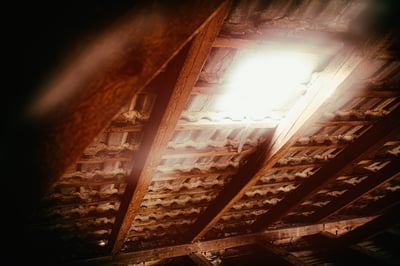
Whether you decide to contact your roofer or your insurance company first, when it comes to the claims process, it’s important to be diligent. To make sure your claim doesn’t get denied. Here are some important steps you can take:
-
Contacting your contractor and insurance company quickly
-
Taking photos of any visible damage as soon as you catch it
-
Understanding your homeowner’s insurance policy
-
Adhering to your roofing warranty
-
Keeping up with professional bi-yearly roof maintenance
How Insurance Adjusters Evaluate Roof Damage: What to Know
Insurance adjusters focus on several aspects during their evaluation. Roofing contractors know how adjusters assess roof damage, which gives them an advantage. Experienced roofing contractors are well-versed in these areas. This insight can be invaluable when you're dealing with roof repairs or replacements following damage.
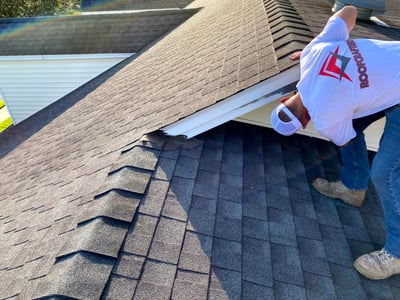
The three key things adjusters are inspecting for:
- Quality of Installation
- Extent of Visible Damage
- Roof Age and Condition
Identifying Issues of Poor Roof Installation
%20(1).jpg?width=400&height=221&name=roof%20is%20damaged%20(2)%20(1).jpg)
If your roof wasn’t installed properly, this could cause issues that could potentially cost your insurance company hundreds, even thousands of dollars in claims. Insurance adjusters are keen on identifying an improper installation. Which can work against you if you’ve suffered storm-related damages. This is one of the reasons it’s incredibly important to hire a reputable roofing contractor to complete any roof replacement or repairs; they’ll get it right the first time around.
Detecting Key Signs of Roof Damage
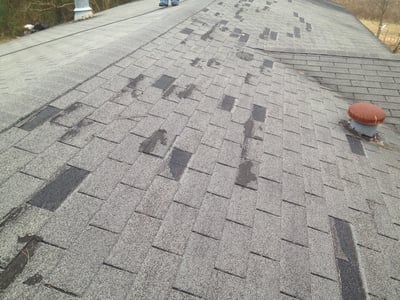
Signs of storm damage are usually evident, while other signs of damage may be difficult to spot. If you’ve unknowingly sustained roof damage before the storm, the insurance adjuster will be able to tell. This could work against you during the claims process. So, remember it’s important to have routine maintenance to catch and repair any damage as soon as possible.
Assessing the Impact of an Aged Roof
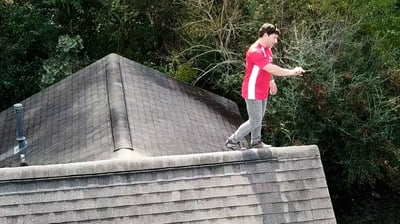
If your roof is over 10 years old, it can become a liability during severe weather conditions. Aged roofs are more susceptible to damage than newly installed roofs, which is why some insurance companies will choose not to renew your policy. If your company does decide to provide you with coverage, sadly they may use it against you when you file your claim. So, be sure to stay up to date on any recommended repairs or installation efforts.
The Role of Roofing Contractors in the Roof Repair Insurance Process
Alright, now you know the best first step after finding damage on your roof. Reach out to your roofing contractor right away. They're the ones with the skills and tools to check out your roof's damage up close. They can determine the issue and identify the necessary repairs.
This is important because they see things that your insurance adjuster might miss. Plus, they'll write down everything that needs to be done to get your roof back in shape.
Keeping in touch with your roofer and your insurance company is key. Your roofer can help answer any questions you have, especially about how much fixing your roof will cost. They'll explain everything so you understand what you're paying for. And remember, our family at RoofCrafters has been assisting homeowners with storm damage claims for 3 decades. We're here to help.
If you’re struggling to find the best contractor for the job, be sure to download “The Top 10 Checklist" It has the questions you want to ask your potential roofing contractor. This checklist includes several prompts to ask your roofer to prepare you to hold the company accountable for its quality of work and services when it comes to your upcoming roofing project.
My name is Cassie, and I’m the Content Manager here at RoofCrafters. I was born and raised in Chicago, Illinois, and made my way out to Florida post-college graduation. I’m incredibly passionate about writing and creating valuable content that helps others with the collaboration of my marketing team. When I’m not working, I enjoy shopping (a little too much), spending time at the beach, and reading!



